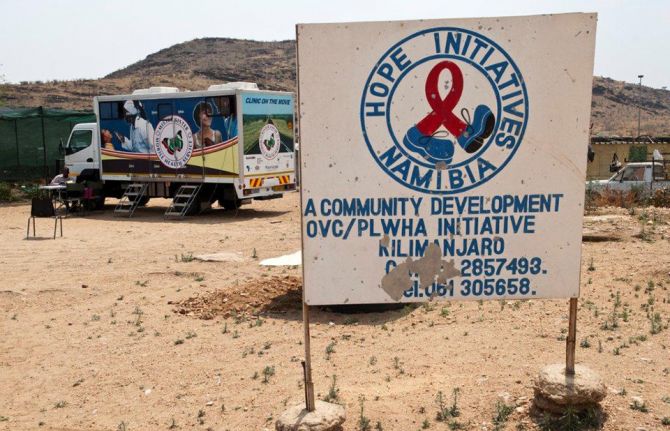EGY

![Sudanese refugees gather as Doctors Without Borders (MSF) teams assist the war wounded from West Darfur, Sudan, in Adre hospital, Chad on June 16, 2023 [Mohammad Ghannam/MSF via Reuters] Sudanese refugees gather as Doctors Without Borders (MSF) teams assist the war wounded from West Darfur, Sudan, in Adre hospital, Chad on June 16, 2023 [Mohammad Ghannam/MSF via Reuters]](/sites/default/files/styles/large/public/sudan_960.jpg?itok=fqyF8jis)

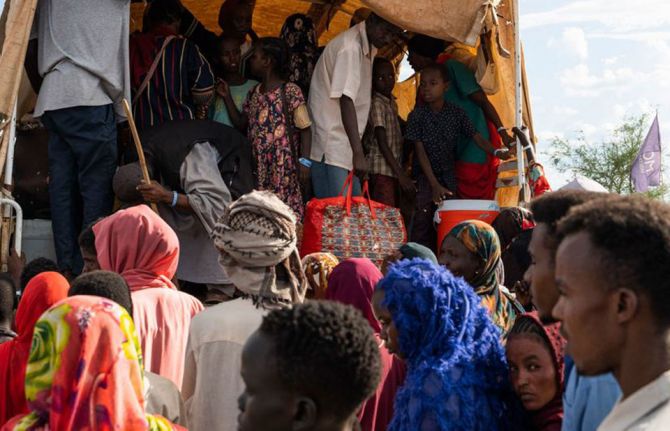
Feature Story
Sudan’s unsung heroes: Protecting people living with and affected by HIV amidst conflict and famine
15 April 2024
15 April 2024 15 April 2024One year ago, on 15 April 2023, armed conflict broke out in Sudan between the Sudanese Armed Forces and the Sudanese Rapid Support Forces. Since then, the situation has worsened. The hostilities, which were initially centred in Khartoum State, have intensified and rendered over half the country inaccessible.
The impact of this conflict has been devastating. Some 8.6 million Sudanese have been forced to flee their homes, 6.8 million are displaced with in the country and 1.8 million have sought refuge in neighbouring countries – Chad, Egypt and South Sudan.
The severity of the humanitarian emergency has been compounded by a deepening famine crisis, with 17.7 million Sudanese facing acute food insecurity, close to 5 million of whom are on the verge of starvation, as reported by OCHA and the Integrated Food Security Phase Classification.
In addition to the humanitarian crisis, the conflict has severely disrupted the healthcare infrastructure. The central depot, which stored all the antiretroviral treatment for people living with HIV in the country is inaccessible and the stock that it holds has since expired.
Before the conflict erupted, 11,000 people living with HIV in Sudan were on HIV treatment, 4000 of whom were lost to follow-up when the war broke out. All HIV prevention and testing services were suspended.
“We are adapting the HIV response in Sudan to the situation in the country. Our priority has been to get anti-retroviral treatment to those who need it, in whatever way we can,” said Elsheikh Ali, UNAIDS Country Director for Sudan.
Despite these challenges, there are unsung heroes who are working tirelessly to ensure that the HIV response continues uninterrupted.
Amidst active war, the displacement of critical partners in the HIV response, poor internet connectivity and communications, sporadic electricity and growing food insecurity, the HIV national response team, with UNAIDS’ support, were able to reconsider, plan and raise resources for this new, national context of the HIV response in the country. The team was able to submit a funding application to the Global Fund to Fight AIDS, TB and Malaria (Global Fund) and to finalize the Global Fund Grant Making process. This secured critical financial support to HIV, TB and Malaria for the next three years. The funds received from previous Global Fund cycles have been used to replace stocks of antiretroviral treatment (ARVs) as well as to establish new HIV treatment storage facilities in safer regions.
During the COVID pandemic, Sudan established a ‘Search and Rescue’ system to track people living with HIV who had their treatment interrupted. Once the conflict in the country escalated, the HIV national response team were able to draw on the ‘Search and Rescue’ system to locate most of the 4000 people living with HIV who were lost to follow-up because of the war and to re-enrol them again to receive HIV treatment services.
“We have heroes here in Sudan, including networks of people living with HIV, who are working in very difficult circumstances, traveling tens of kilometres and risking their safety, to personally deliver ARVs to the people who need it,” said Elsheikh Ali, UNAIDS Country Director, Sudan. “These are the people we should be applauding; they are the ones keeping the HIV response going in the middle of a war and famine.”
The Ministry of Health, whose infrastructure has been significantly disrupted, is trying to provide critical HIV services including treatment and PEP (emergency medicine for HIV taken to prevent the virus in case of potential exposure to the virus) in regions of the country where there is active warfare. In more stable areas, more comprehensive HIV services are now being offered to those who need them.
In the face of the escalating humanitarian crisis in Sudan, there are dedicated people who remain steadfast in their commitment and working selflessly to mitigate the impact of the conflict on the HIV response.
“The HIV national response team exemplify the resilience the AIDS response,” said Anne Githuku-Shongwe, UNAIDS Regional Director Eastern and Southern Africa. “In the face of adversity – war, displacement, famine – and against all odds, they have found a way to continue collaborating to uphold the HIV response.” She adds, “They have completed a successful Global Fund grant in the middle of an active war. They have made sure that people living with HIV across Sudan are not being left behind, that they are found, there is treatment available for them and that they receive it. That is resilience, commitment and leadership.”
Related


Feature Story
UNAIDS supporting people stranded in Egypt to access HIV treatment
29 June 2020
29 June 2020 29 June 2020Hundreds of thousands of people around the world have been stranded abroad due to the bans on flights and border closures imposed to stop COVID-19. As elsewhere, thousands of non-nationals have been stranded in Egypt indefinitely.
Travel restrictions have had many repercussions on the daily lives of non-nationals, putting significant economic pressure on them and potentially putting their well-being at risk.
The UNAIDS Country Office for Egypt has been working on COVID-19 from the start of the pandemic in the country, establishing a direct line of communication with the National AIDS Program and working with it to ensure the continuation of HIV treatment by everyone on it and to help non-nationals in Egypt to get supplies of antiretroviral therapy.
Sophia Bianchi (not her real name) is an Italian tourist stranded in Sharm El Sheikh. “I ordered my antiretroviral treatment in late April from Italy via a courier service. Unfortunately, the shipment was stuck at the airport customs in Cairo for weeks. I contacted UNAIDS and they have been very helpful, following up daily with the Egyptian Ministry of Health and Population to get approval for releasing the shipment and checking on me and my health. They kept pushing through the Eid holidays and it all got resolved in two weeks. It was a stressful time but now I am relieved,” she said.
Antiretroviral therapy is available in Egypt free of charge to all nationals and registered refugees. However, as there is no community-based dispensing, nor private market purchase of antiretroviral medicines, gaps remain in ensuring that non-nationals can access treatment. For this reason, UNAIDS’ work during the COVID-19 pandemic has been essential in bridging the gaps.
There are strict rules on the dispensing of antiretroviral therapy in Egypt—only close family members are able to collect it from the dispensing centre. For Fatima Ahmed (not her real name), a refugee from Yemen who because of chronic illnesses that put her at higher risk from COVID-19 cannot leave her house, this was a significant barrier to accessing her HIV treatment. UNAIDS got in contact with the Egyptian Ministry of Health and Population to get an exceptional approval to dispense her medicine through a nongovernmental organization.
“I have not left the house for more than three months. My family has not been able to support me financially, so I was left without revenue. Thanks to the support of the National AIDS Program and MENA Rosa, a nongovernmental organization, peer supporters have delivered three months of antiretroviral treatment to my doorstep,” said Ms Ahmed.
However, much still remains to be done in reaching out to the most in need in Egypt. UNAIDS in Egypt has been advocating for the right to health and universal health coverage for everyone and is working in partnership with the Egyptian Ministry of Health and Population to ensure treatment for all nationals and non-nationals in the country.
“We believe in the absolute right of everyone to have access to their basic right to health. Ensuring access to antiretroviral therapy during these exceptional times is therefore our upmost priority. We are working relentlessly with our governmental and nongovernmental partners to build long-term policies to ensure treatment and care services for people living with HIV during times of emergency,” said Walid Kamal, the UNAIDS Country Director for Egypt.
Our work
Region/country
Related


Feature Story
Scaling up stigma-free services for women in Egypt
11 April 2019
11 April 2019 11 April 2019When the family and neighbours of Salma Karim (not her real name) found out that she was living with HIV they chased her out of her home. With nowhere to go, she was forced to leave her two young children behind. This is not an uncommon story in Egypt. One in five people living with HIV report being forced to leave their homes by their landlords, family or neighbours.
High levels of stigma and discrimination are one of the key factors driving new HIV infections in the country, which doubled between 2010 and 2016. Women and adolescent girls are often the most vulnerable. Societal norms, gender inequality, economic dependence, legal discrimination and harmful practices affect them disproportionately, making them more vulnerable to HIV and facing greater levels of stigma and discrimination in the event of HIV infection.
In 2016, UNAIDS in partnership with the Egyptian Ministry of Health and Population joined efforts towards a gender-transformative response to the HIV epidemic. With funding from the Dutch government, a pilot project called Enhancing Sexual and Reproductive Health of Women Living with and Affected by HIV was launched. Three years later, the pilot has reached double its intended beneficiaries with stigma-free quality sexual and reproductive health services.
“I lost my first child as I didn’t know I had HIV,” explains Nour Tarek (not her real name). It was in one of the pilot project sites in Giza that she received the support to realize her reproductive rights free from discrimination. “I followed up with the doctor in the hospital and I became pregnant again.”
Thanks to the antiretroviral medicine she received while pregnant, her baby Mona (not her real name) was born HIV-negative. “I still have to test again until she is older to make sure she is fine,” explains Ms Tarek.
Having proved its success, the pilot project is now being scaled up to a third of the country’s governorates. The aim is to deliver high-quality sexual and reproductive health and HIV services for 1300 women living with HIV and 3000 women at higher risk of acquiring HIV. Its focus on building the capacity of health-care providers and civil society organizations will be key to avoiding future stigma and discrimination, which is reported to lead one in four people living with HIV in Egypt not to disclose their HIV status when seeking care.
During his visit to Cairo on 9 April, the Executive Director of UNAIDS, Michel Sidibé, and the Ambassador of the Netherlands to Egypt, Laurens Westhoff, discussed the expansion of the project. Implemented through a new three-year Dutch grant, the scaled-up services will complement national efforts to achieve Egypt’s ambitious new National AIDS Strategy 2018–2022 and the Sustainable Development Goals.
Region/country
Related

Feature Story
Young people to campaign against stigma and discrimination in Egypt
27 February 2019
27 February 2019 27 February 2019Ahead of Zero Discrimination Day, young people came together in Cairo, Egypt, to learn how to respond to HIV-related stigma and discrimination and to hear about how the HIV epidemic affects Egypt and the role that young people can play in the AIDS response.
“The burden of the epidemic is higher on young people. In Egypt, it is for young people to lead the HIV response,” said Walid Kamal, Egypt’s National AIDS Programme Manager.
During a discussion on stigma and discrimination, people living with HIV shared some of their testimonies and experiences, helping to give the participants a deeper understanding of how stigma and discrimination affects people living with HIV.
“It is our responsibility to help people living with HIV feel part of the community,” said one of the participating young people.
“It is not only about AIDS, it is about social justice, equality, the empowerment of women and promoting healthy gender norms,” said Ahmed Khamis, the UNAIDS Country Manager for Egypt.
The participants also learned how to plan, design and implement online awareness and advocacy campaigns on social media.
At the end of the meeting, organized by UNAIDS and the National AIDS Programme and held on 21 February, the young people agreed to lead social media campaigns to highlight the harm caused by stigma and discrimination. Starting on 1 March, Zero Discrimination Day, and running for three weeks, the campaigns will be supported by the UNAIDS country office in Egypt and are endorsed by Egypt’s Ministry of Health and Population.
Region/country
Related
 Government ensures continuity of treatment in Malawi
Government ensures continuity of treatment in Malawi

10 February 2025

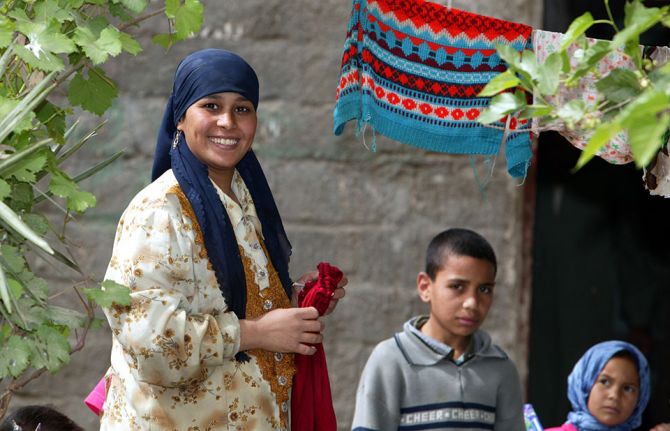
Feature Story
Stepping up sexual and reproductive health services in Egypt
04 June 2018
04 June 2018 04 June 2018In response to a call by women living with HIV in Egypt for an increase in the availability of quality sexual and reproductive health services delivered free from stigma and discrimination, UNAIDS mobilized partners and engaged with Egypt’s national AIDS programme.
The result was a pilot project that ran from 2016 to 2018 in which almost 300 women across the country were provided with family planning, antenatal care, support during delivery, postpartum care and guidance on the prevention of mother-to-child transmission of HIV.
On 30 May, national stakeholders, including representatives of the Ministries of Foreign Affairs and Health and Population, civil society, academia and people living with and affected by HIV, gathered to highlight the key achievements, experiences and lessons learned from the pilot.
“I benefited from the project counselling service throughout my pregnancy. I started taking medicine, and, with follow-up, I had a child free from HIV, which I never thought was possible or an option,” said an Egyptian woman living with HIV.
The pilot project achieved outstanding results, reaching nearly double the number of people originally planned to be reached and building institutional expertise in sexual and reproductive health. Counselling and psychosocial support was provided by health professionals and supported by women living with HIV.
“This project is a continuation of the collaboration and fruitful partnership between UNAIDS and the Egyptian Government. We congratulate the Government of Egypt for addressing the needs of a highly marginalized population,” said Ahmed Khamis, the UNAIDS Country Manager for Egypt.
Dr Ahmed Khamis, UNAIDS Country Manager, gives the opening speech on the closing and final dissemination of key results of the “Enhancing Sexual and Reproductive Health of Women Living with HIV” pilot project; with Dr Alaa Eid, Under Secretary for Preventive Medicine, Ministry of Health and Population, H.E. Laurens Westhoff, Ambassador of the Netherlands in Cairo and Ambassador Seif-alla Kandeel, Director of UN Specialized Agencies, Ministry of Foreign Affairs (from left to right). Photo taken by Mohamed Ezz
The pilot programme was funded through financial support from the Embassy of the Netherlands in Egypt and covered the Giza and Gharbia Governates of Egypt and was later extended to the Dakahlia Governate.
“The Netherlands is strongly committed to curbing the spread of HIV worldwide as an integral part of our contribution towards the achievement of the Sustainable Development Goals. We are proud of our partnership with UNAIDS and the Egyptian Ministry of Health. The Netherlands Government is committed to participate in the next step,” said Laurens Westhoff, Ambassador of the Netherlands to Egypt.
As the next step, the Netherlands is finalizing an agreement for a scaled-up three-year project, doubling the number of women living with HIV reached.
“There is no silver bullet to combat HIV. It’s only through partnership that the challenges of awareness, attention and access to medicine can be tackled,” said Seif-Allah Kandeel, Director, United Nations Specialized Agencies, Egyptian Ministry of Foreign Affairs.
Region/country

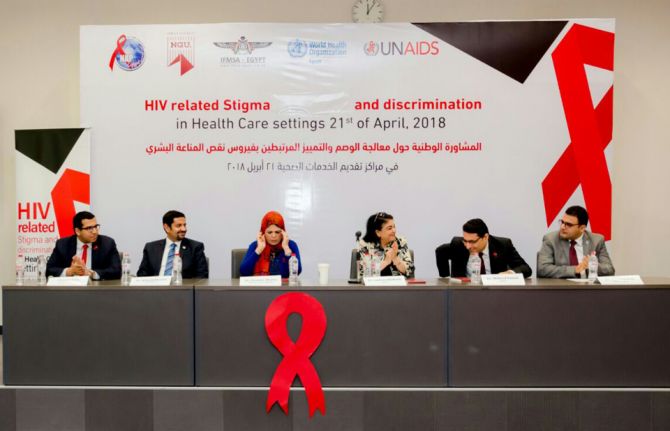
Feature Story
Egyptian medical students meet to address stigma and discrimination in health-care settings
25 April 2018
25 April 2018 25 April 2018Stigma and discrimination and other human rights violations occur in health-care settings worldwide, barring people from accessing health services or enjoying quality health care. Such stigma and discrimination further increases the vulnerability of people living with and affected by HIV.
To discuss this problem, nearly 300 Egyptian medical students, representing 18 universities across Egypt, met with representatives of academia, civil society, the government and the Egyptian Medical Syndicate. With support from UNAIDS, the Egyptian branch of the International Federation of Medical Students’ Associations held a one-day consultation on HIV-related stigma and discrimination in health-care settings on 21 April in Cairo, Egypt.
“People living with HIV should have equal rights and opportunities. Denial of access to health-care services is unacceptable. Through this consultation, we aim to inform our national strategy with new interventions for addressing stigma and discrimination,” said Walid Kamal, the National AIDS Programme Manager for Egypt.
During the consultation, the participants took stock of the progress made in addressing stigma and discrimination and decided to hold an ongoing dialogue to identify actions to address stigma and discrimination in health-care settings.
“We are witnessing an unprecedented opportunity for addressing discrimination in health-care settings with political support and programmatic vision. While resources are scarce, we count on the support of medical students as leaders of tomorrow and the power of volunteerism to address this issue,” said Ahmed Khamis, the UNAIDS Country Manager for Egypt.
The participants agreed that accountability mechanisms need to be in place to monitor and evaluate interventions, ensuring that proper actions are taken by the relevant authorities to address rights violations in health-care settings.
“Medical ethics is a must among health-care providers. The Egyptian Medical Syndicate is organizing workshops and conferences to enforce ethics among health-care providers. I would like to remind you all of the rights of patients,” said Sherine Ghaleb, representative of the Egyptian Medical Syndicate.
The participants agreed to prioritize launching the Ministry of Health and Population’s stigma-free policy and integrating HIV-related stigma and discrimination in the module on ethics taught to all doctors who graduate in Egypt. They also agreed to give access to the accountability and investigation mechanism of the Egyptian Medical Syndicate to civil society organizations and people living with HIV in order to report violations and to roll out information on post-exposure prophylaxis in the curricula of medical schools.
The recommendations made during the consultation were endorsed by the National AIDS Programme and will be included in Egypt’s road map for addressing HIV stigma and discrimination in health-care settings. Progress of the road map will be monitored by a group that includes a strong representation from people living with HIV.
Region/country
Related
 Government ensures continuity of treatment in Malawi
Government ensures continuity of treatment in Malawi

10 February 2025

Update
Landmark court ruling in Egypt prohibits HIV discrimination in the workplace
01 July 2016
01 July 2016 01 July 2016Ahmed was dismissed from his job as a plumber for a club in Giza, Egypt, in 2015 after his employer discovered he was living with HIV. Rather than remain silent, Ahmed decided to pursue legal action with the help of the Al Shehab Foundation for Comprehensive Development.
The Al Shehab Foundation is an Egyptian nongovernmental organization that defends the legal rights of marginalized people, including the rights of people living with HIV to work and access education and accommodation without discrimination. The legal action was supported by the International Development Law Organization, which works closely with UNAIDS through a memorandum of understanding.
In a historic decision for Egypt and the region, a court in Cairo ruled in Ahmed’s favour, stating that people living with HIV cannot be dismissed because of their HIV status. The court’s directive, issued in February 2016, stated that employment is a basic human right for all Egyptian citizens, regardless of their health condition, as long as they can still work.
This seminal court ruling has been applauded by civil society, activists and international development organizations engaged in the AIDS response in Egypt and across the Middle East and North Africa. The ruling sets an important legal precedent for future discrimination cases and is consistent with UNAIDS guidance and the Arab AIDS Strategy (2014 – 2020).
Quotes
“The court ruling has changed my life significantly, as I no longer fear losing my job due to my HIV status.”
“We have been fighting for many years for an Egyptian court to affirm the right of people living with HIV to work without discrimination.”
“The court decision affirming the right of people living with HIV to work is consistent with relevant international legal frameworks.”
“This court decision will set an important precedent for ensuring zero discrimination in the workplace for the whole region.”
Region/country
Related
 Government ensures continuity of treatment in Malawi
Government ensures continuity of treatment in Malawi

10 February 2025

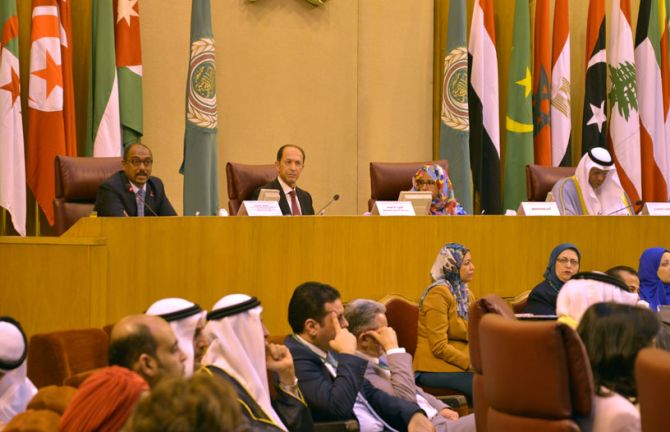
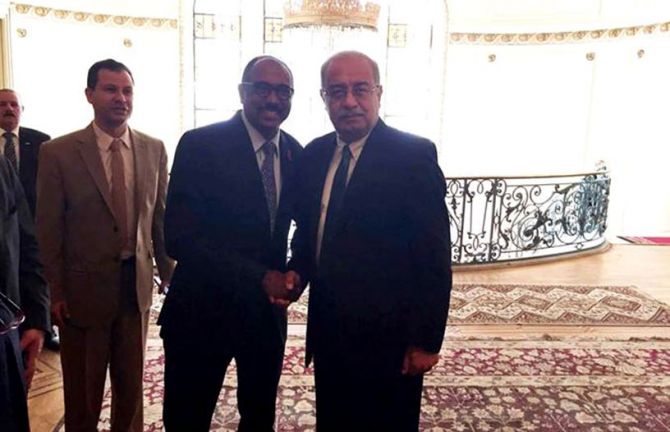
Update
Arab countries reaffirm their commitment to end the AIDS epidemic
07 March 2016
07 March 2016 07 March 2016The Council of Arab Ministers of Health has unanimously endorsed a resolution that urges countries to accelerate their efforts for the implementation of the Arab AIDS Strategy and to Fast-Track national responses to end AIDS by 2030.
Speaking at the council meeting, held in Cairo, Egypt, on 3 March, UNAIDS Executive Director Michel Sidibé commended the leadership the council and ministers have demonstrated in the AIDS response. He noted that the Arab AIDS Strategy (2014–2020) presents a unified position, is informed by evidence and considers regional specificities. He said that, in the context of the Sustainable Development Goals, there is an urgent need to reduce health inequities between countries by embracing global health security principles derived from values of social justice and inclusive societies for all.
Mr Sidibé also expressed hope that Oman, the United Arab Emirates and other Arab countries would soon be certified as having eliminated mother-to-child transmission of HIV. He urged countries that are on the verge of achieving this goal to finalize the validation process and become pioneers in the region.
The Deputy Secretary-General of the League of Arab States, Ahmed Benhelli, met with Mr Sidibé and pledged to mobilize support for the upcoming United Nations General Assembly High-Level Meeting on Ending AIDS, to be held in June in New York, United States of America. In bilateral meetings with the Ministers of Health of Bahrain, Djibouti and Libya, Mr Sidibé highlighted the importance of high-level participation by Arab countries and their effective contribution to a strong political declaration.
The significant and catalytic leadership role Egypt has in the region was raised by Mr Sidibé in a meeting with the Egyptian Prime Minister, the Assistant Minister of Foreign Affairs, the Minister of Health and the Minister of Social Solidarity. He emphasized that Egypt is forging strong partnerships in Africa, especially in the local production of medicines, which is essential to ensure and sustain universal health coverage in the Middle East and Africa.
During his visit to Egypt, Mr Sidibé was introduced to Yousra, a renowned actress and singer who was recently appointed as a UNAIDS Regional Goodwill Ambassador for the Middle East and North Africa. Through her advocacy, Yousra has shown the impact regional champions and celebrities can have in building bridges and reaching out to leaders to end AIDS in the region by 2030.
Quotes
“This region can be a hub of excellence and greater partnership for development in Africa. Its values of social justice and inclusive society can help significantly reduce inequality as a threat to global health security.”
“Through the strong, dynamic partnership with the UNAIDS regional support team, we have achieved great results in the last three years. The League of Arab States is committed to supporting the United Nations General Assembly High-Level Meeting on Ending AIDS and a strong political declaration to end AIDS by 2030.”
“Egypt strongly supports the mandates of UNAIDS and is keen to fulfil them in line with an evidence-based approach while using the best expertise, innovative thinking and the right advocacy messaging to reach global agreement in the AIDS response, including at the United Nations General Assembly High-Level Meeting on Ending AIDS.”
“Engaging civil society organizations and a very benevolent private sector in our work is extremely crucial in service provision. They can help us with awareness and sensitization, tolerance, fighting stigma and discrimination and scaling up social protection programmes.”
Region/country
Related
 Government ensures continuity of treatment in Malawi
Government ensures continuity of treatment in Malawi

10 February 2025

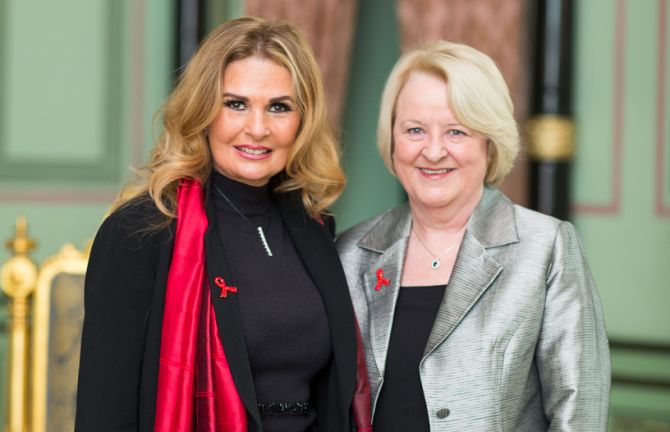
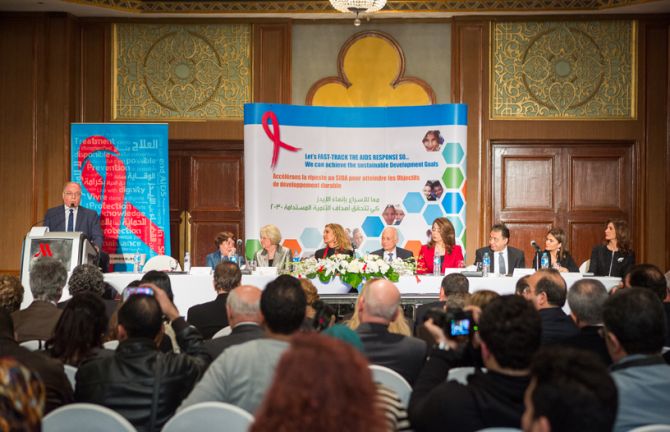
Update
Actress and singer Yousra named UNAIDS Regional Goodwill Ambassador for the Middle East and North Africa
01 February 2016
01 February 2016 01 February 2016Egyptian actress and singer Yousra was appointed as a UNAIDS Regional Goodwill Ambassador for the Middle East and North Africa at an event held in Cairo, Egypt, on 31 January that brought together a wide range of key partners.
The Secretary-General of the League of Arab States, ministers, former ministers, ambassadors, policy-makers, people living with HIV, representatives of the private sector, civil society, United Nations agencies and academia, celebrities and the media came together for the event.
UNAIDS Deputy Executive Director Jan Beagle announced the regional goodwill ambassador appointment, underlining that Yousra, with her iconic status, will be a critical voice for UNAIDS and the AIDS response in the region, particularly in the lead-up to the High-Level Meeting on AIDS, to take place in June 2016 in New York, United States of America.
Ms Beagle stressed that Yousra will be a champion for the implementation and financing of the Arab AIDS Strategy. Her engagement will contribute significantly to ensuring a Fast-Track response to HIV in the region, towards the goal of ending AIDS by 2030.
Speaking at the event, Yousra emphasized her commitment to uniting people across sectors and to being a champion to advance the AIDS response in the region. She underlined the importance of eliminating stigma and discrimination against people living with and affected by HIV and of empowering women.
In 2014, an estimated 240 000 people were living with HIV in the Middle East and North Africa region, which faces growing inequalities, rising migration, escalating humanitarian emergencies and discriminatory laws. To end the AIDS epidemic in the region, there is a strong need to address the determinants of these vulnerabilities and deliver holistic services free from stigma and discrimination to people living with and at risk of HIV.
Quotes
“We should all work together to end AIDS by 2030, in line with the Sustainable Development Goals. I call on all members of the Arab League to develop and implement national strategies and programmes aligned to the objectives and priorities of the Arab AIDS Strategy, endorsed by the Arab Council of Ministers of Health in 2014.”
“Yousra is the right person at the right time—she will be a critical voice for UNAIDS and the AIDS response in the Middle East and North Africa, promoting the implementation and financing of the Arab AIDS Strategy.”
“It is indeed a historic moment for me. I consider it a blessing to be able to have this golden opportunity to give hope and love, along with other UNAIDS Goodwill Ambassadors around the world, to people excluded from their communities, faced with constant stigma and discriminated against in all aspects of their lives.”
Region/country
Related
 Government ensures continuity of treatment in Malawi
Government ensures continuity of treatment in Malawi

10 February 2025

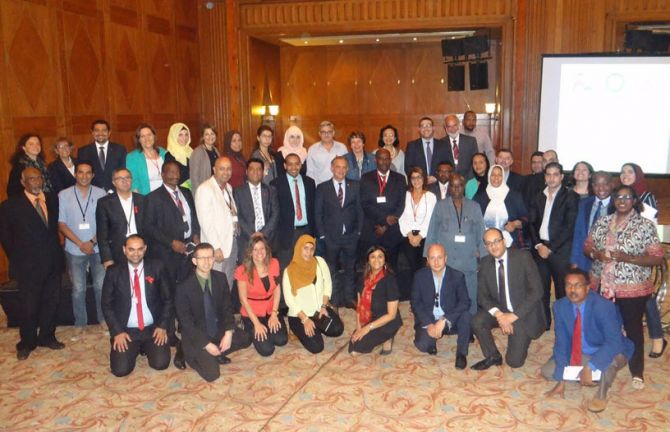
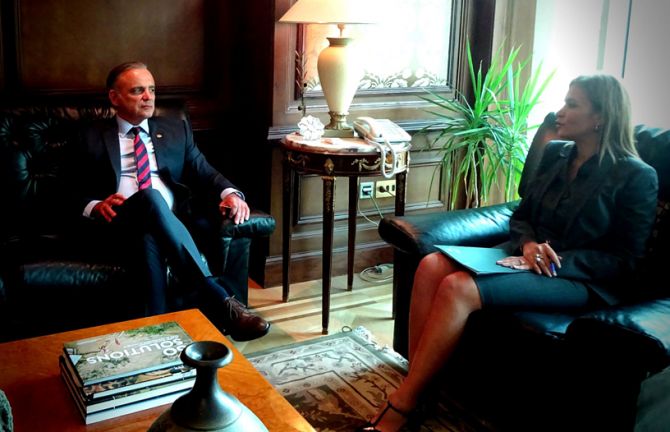
Update
Resilient HIV responses needed in countries affected by humanitarian crises
07 October 2015
07 October 2015 07 October 2015Countries affected by humanitarian crises in the Middle East and North Africa are facing enormous challenges to respond effectively to the AIDS epidemic. Interruption of HIV services, limited prioritization of HIV in humanitarian responses and limited capacity of national programmes are just some of the challenges faced by countries.
UNAIDS, in collaboration with the Regional/Arab Network against AIDS (RANAA) and the General Secretariat of the League of Arab States, organized a two-day consultation in Cairo, Egypt, on 30 September and 1 October 2015 to discuss ways to strengthen national capacities for a resilient HIV response and to reach the goals of the Arab AIDS Strategy (2014–2020), which were endorsed by the Council of Arab Ministers of Health in March 2014.
Participants outlined linkages, entry points and priority actions for HIV integration in humanitarian response as well as the technical support needs for countries in emergency situations. The protection of people affected by humanitarian emergencies, including refugees, asylum seekers and internally displaced people, was identified as a key priority in the Middle East and North Africa.
Speaking at the consultation, UNAIDS Deputy Executive Director Luiz Loures emphasized that fostering partnerships with clear roles and responsibilities is key to addressing the needs of countries. He also noted that while conflict is a global reality, it is particularly affecting the Middle East and North Africa. He stressed the need to reach out to the people most vulnerable and excluded, to devise mechanisms to ensure that no one is left behind and to take into consideration sexual violence in conflicts.
The consultation is the first to contribute to the UNAIDS Programme Coordinating Board’s technical dialogue on HIV in emergency contexts.
In a meeting with civil society and key populations from conflict affected countries of the region, Mr Loures urged them to focus, look for data and be innovative in the response and never compromise on their critical role in putting people first.
Quotes
“The notion of working for the most excluded is a fundamental reality for all partners and not an option if we want to see the end of the AIDS epidemic as a public health threat.”
“We commit to coordinate, collaborate and support a serious development process to address the challenges of HIV, which threatens the advancement of the development agenda of this region.”
“I am looking forward to forging a stronger partnership with the UN, including UNAIDS, with the objective of improving the lives of Egyptian people and enhancing their overall wellbeing, and with a special focus on youth and women issues, reaching under served governorates, and catering to the needs of the most vulnerable segments of society.”
“We want to consider in our interventions prioritization, integration and mobilization of resources in order to make the difference we wish to see, as the situation for refugees is expected to worsen.”
“When we say fragile communities, we do not refer to people but to the environment they live in and when we say humanitarian crises we do not stigmatize, since we are facing these crises together and the only way to move forward is to join hands and collaborate.”
Region/country
Related
 Government ensures continuity of treatment in Malawi
Government ensures continuity of treatment in Malawi

10 February 2025

